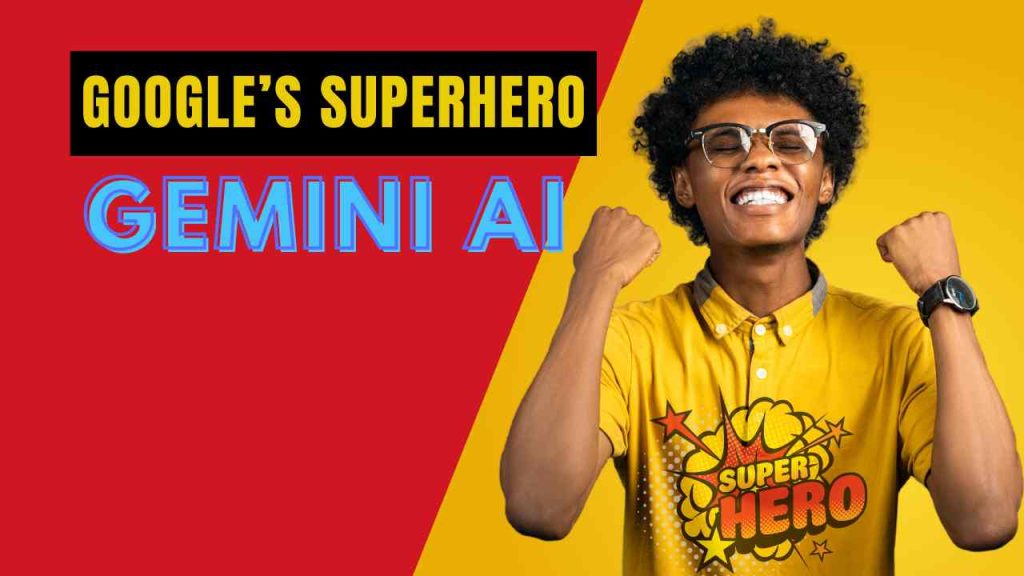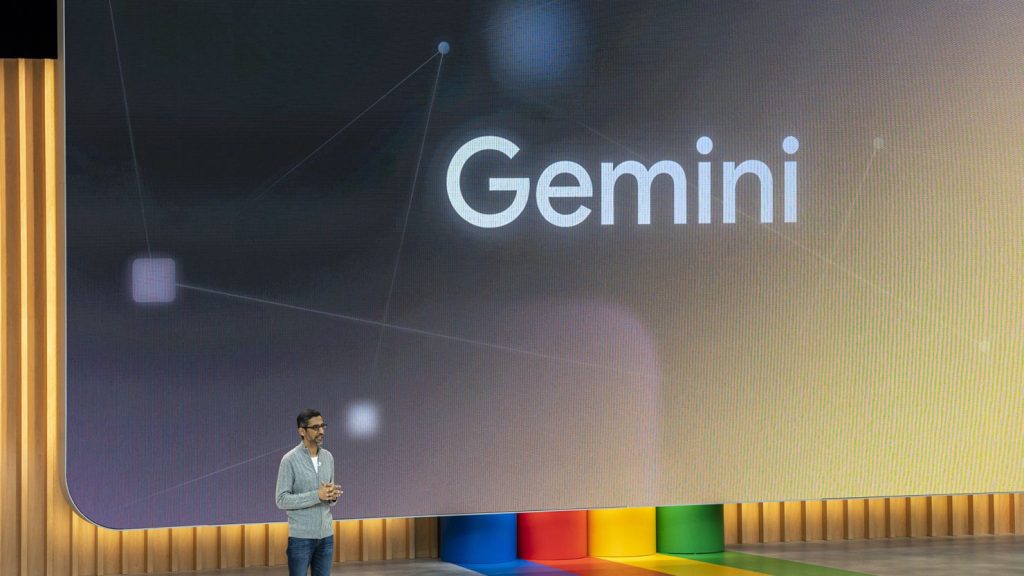The world of Artificial Intelligence (AI) is constantly evolving, and Google, at the forefront of this change, has recently unveiled its latest creation – Gemini. This groundbreaking AI model promises to revolutionize the way we interact with technology and has the potential to surpass its rival, OpenAI’s ChatGPT.
But what exactly is Gemini, and how can it surpass ChatGPT?
Gemini is a multimodal, large language model (LLM), meaning it can process and understand information in various formats, including text, images, audio, and video. This allows it to be significantly more versatile than its competitors, which are often limited to text only.
Here are some key features of Gemini that set it apart:
- Advanced Reasoning: Gemini can understand and respond to complex questions and requests, demonstrating a deeper level of understanding than ChatGPT.
- Multimodal Capabilities: As mentioned earlier, Gemini can process and understand information from various formats, making it ideal for tasks like generating creative text formats, translating languages, and writing different kinds of creative content.
- Scalability: Gemini comes in three versions: Nano, Pro, and Ultra, each catering to different needs and workloads. This makes it accessible to a wider range of users, from individuals to large organizations.
- Performance: Google claims that Gemini outperforms ChatGPT on 30 out of 32 benchmark tests, indicating its superior capabilities in various areas.
Vision for the Future: A World Powered by Gemini

Google envisions a future where Gemini is seamlessly integrated into various aspects of our lives. Here are just a few potential use cases:
- Education: Gemini could personalize learning experiences, provide immediate feedback on assignments, and even translate languages in real-time, making education more accessible and engaging.
- Productivity: Imagine a world where Gemini helps you write emails, complete reports, and schedule appointments, freeing up your time for more important tasks.
- Entertainment: Gemini could create personalized stories, generate music, and even design video games, offering endless possibilities for entertainment.
- Accessibility: Gemini could be used to develop tools for people with disabilities, such as text-to-speech and sign language interpretation, making the world a more inclusive place.
The Role of Gemini in Generative AI
Generative AI is a rapidly growing field with enormous potential. Gemini has the potential to play a vital role in this domain by:
- Pushing the boundaries of what is possible: With its advanced capabilities, Gemini can generate even more creative and innovative content, opening up new avenues for artistic expression and scientific discovery.
- Democratizing AI: By making it easier to develop and use generative AI models, Gemini can empower individuals and businesses to create their own AI-powered applications, fostering innovation and economic growth.
- Addressing ethical concerns: Google is committed to developing AI responsibly and has implemented safeguards to mitigate potential risks associated with generative AI. Gemini is no exception and is designed to be used safely and ethically.
Benefits for the Common User:
Even if you’re not a tech expert, Gemini has the potential to significantly impact your daily life. Here are just a few examples:
- Improved Search: Gemini could provide more relevant and personalized search results, making it easier to find the information you need.
- Enhanced Communication: Gemini could help you write more effective emails, translate languages, and overcome communication barriers.
- Personalized Experiences: Gemini could tailor your experience on Google products, including Gmail, YouTube, and Maps, making them more relevant to your needs and interests.
Affordability and Integration Scopes of Google Gemini
While the potential applications of Google Gemini are vast, two crucial factors need to be considered for its widespread adoption: affordability and integration scopes.
Affordability:
- Current Pricing Model: Google currently offers three versions of Gemini: Nano, Pro, and Ultra, each with varying capabilities and price points. The Nano version is available for free, making it accessible to individual users and small businesses. However, the Pro and Ultra versions are likely to be significantly more expensive, potentially limiting their accessibility to larger organizations.
- Potential for Open-Source Development: Google has a history of open-sourcing its AI technologies, such as TensorFlow and Kubernetes. This could eventually lead to an open-source version of Gemini, making it more affordable for researchers and developers to build upon.
- Impact on Affordability: The affordability of Gemini will play a crucial role in its success. If it remains too expensive, its adoption could be limited, hindering its potential impact.
Integration Scopes:
- Existing Google Products: Gemini’s integration with existing Google products, such as Search, Gmail, and YouTube, could significantly enhance their capabilities and personalize user experiences.
- Third-Party Platforms: Integrating Gemini with third-party platforms, such as social media and productivity tools, could further expand its reach and impact.
- Open APIs: Providing open APIs for Gemini could enable developers to create custom applications and build upon its capabilities, fostering innovation and ecosystem growth.
- Technical Challenges: Integrating Gemini with various platforms and applications presents technical challenges, including data compatibility, security considerations, and performance optimization.
Balancing Affordability and Integration:
- Freemium Model: Google could consider a freemium model, offering limited access to Gemini for free with the option to upgrade for additional features and capabilities.
- Partnering with Developers: Partnering with developers and organizations to build applications and integrations could expand Gemini’s reach and affordability.
- Standardized Integration Interface: Developing a standardized interface for integrating Gemini with various platforms could simplify the process and encourage wider adoption.
Conclusion: Google’s Bold Vision for the Future of AI
Google’s vision for the future of AI is clear: to create a world where AI is accessible, helpful, and beneficial to everyone. This vision is driven by groundbreaking technologies like Google Gemini, a powerful multimodal LLM with the potential to revolutionize the way we interact with technology.
Here are some key takeaways that highlight Google’s bold vision for AI:
- Focus on Affordability and Integration: Google recognizes the importance of making AI affordable and accessible to a broad range of users. The freemium model for Gemini and its open API offer promising solutions for wider adoption.
- Emphasis on Responsible Development: Google prioritizes ethical considerations in AI development. Gemini is designed with safeguards to mitigate potential risks and ensure its responsible use.
- Collaboration and Ecosystem Growth: Google actively seeks collaboration with developers and organizations to build upon Gemini’s capabilities and foster innovation within the AI ecosystem.
- Personalized and Enhanced Experiences: Google envisions a future where AI seamlessly integrates into our daily lives, personalizing and enhancing our experiences across various products and services.
- Empowering Users and Solving Global Challenges: Google believes that AI has the potential to empower individuals and address some of the world’s most pressing challenges. Gemini’s versatility and advanced capabilities make it a valuable tool for tackling complex issues in areas like education, healthcare, and climate change.
Looking ahead, Google’s AI journey is full of exciting possibilities. With its commitment to innovation, responsible development, and collaboration, Google is well-positioned to lead the way in shaping a future where AI empowers individuals and contributes to a better world.
Here are some resources that further illustrate Google’s vision for the future of AI:

- Sundar Pichai’s keynote address at Google I/O 2023
- News articles reporting on Pichai’s comments about Gemini
Also read Google Flutter: The Future of Enterprise Mobile App Development

